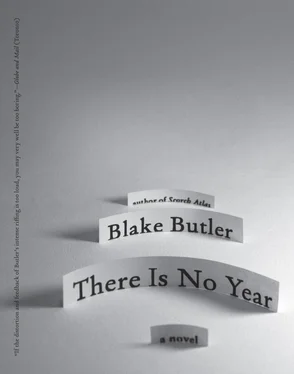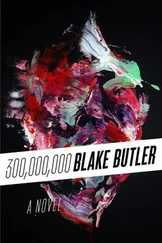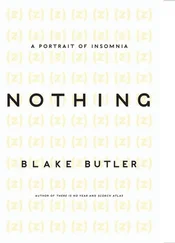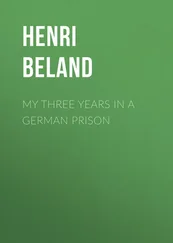The mother closed her eyes. She walked back into the bathroom feeling her way. Back at the rip there, the hole, the pucker, the mother worked with eyes still closed. The mother spread the wall with putty over the new hole, sealing it full whole. The first few blobs went hot and runny and sank into the surface. It burned her on the hands. She had to reapply the substance several times before it stuck and even then it slid and bubbled. She sang inside her, making silence, rehearsing lines from a play she’d been in the year just before the child was born — lines sealed inside herself. When the new wall was halfway dry the mother pressed her thumb into its softish face. The mother felt something transfer through her.
The mother went back into the house and washed the floors again. She washed the floors again. She washed the floors until she could crawl upon them. Until she could lick and kiss and laugh and feel fine in this house clean of all others. She could somehow hear the mirror, upstairs, shaking.
Yes yes yes, the mother said, rolling. Yes yes yes yes yes yes yes yes yes yes yes yes yes yes.
Now with the momentum really in her, gassed and ticking, the mother drove to the grocery down the street and bought as much cleaning product as she could carry. All the prices seemed very high. She watched the items scan across an electronic neon zapper by a young man who would not open his mouth or blink his eyes. The young man had a photograph in his pocket, folded halfway fourteen times, a picture of himself contorted in a position that made his body seem to not be there. The mother handed this young man her cash. He looked, too, like the young father, though the mother could not remember who that was.
Back at home the mother took the son out on the battered lawn to sit and gather sun. She’d called again to keep the child home, nearer to her, needing. The mother felt determined. Her insides goggled, warm with war. There was nothing about the house she’d leave to fester any longer. The mother wrapped a clean dry cloth around her face and forehead, leaving room only for her eyes. She patrolled the house wielding one can after another, spraying every surface, every inch. She wiped and foamed and sprayed and swished and swum and wiped. She cleaned the walls, the floors (again), the blades of fans, the blades of knives and other utensils, the countertops, air vents, knobs and handles, baseboards, corners, nooks, books (she thumbed through pages), closets, clasps, curtains, windows, boxes, things inside boxes, crumbs in cracks. She stood on stools on chairs on tiptoes and splashed the ceiling down. Her body sizzled lightly. Her fingers tingled from how they weren’t getting enough blood.
Outside the house took on an aura. The chemic stink pillowed out for blocks. The mother went out and strapped the son’s face with its own mask. She still felt she had not done enough. She felt impulsive. She went back through the house, now walking backward. She began to take certain things against her chest. She smashed ceramic heirloom plates. She took the street numbers off the house. She called the phone company and had their number changed. She took the bed linens and pillows into the backyard and burned them. She burned the picture of the man and of the father at the party. She burned some clothing. She burned a sofa. She burned the relics of the son’s condition. It was time. The past. The after. The mother felt she had been foolish. Caught up. She burned the plaster cast of the son’s chest and his sick drawings and his thermometers, his night-light. She burned any inch that had held ill.
The mother thought of other things to do. In the half-light of the bugged sun, the mother went through the woods wielding a steak knife, in search of the place she’d hid the copy son but she could not find him among all else. She dragged the winter lid onto the pool.
The mother’s mind designed itself.
By the end of early evening, the house felt mostly new. If not new, clean. If not clean, better. If not better, something. The mother snuck one of the father’s cigarettes from underneath his pillow. She went behind the house to smoke it, watching the son from around the corner of the house. The light over the house seemed like something funneled through a tarp. The air was thick and rather fat. The son was smiling. He had strange teeth — chalked and spattered with flecks of diseased color. The son might never kiss a woman. The son did not like to kiss regardless. The mother stroked her arm a little. The mother dragged the last ash from the cig and tabbed the butt against her whitish tongue and pressed her tongue against the mouth roof and sucked a little with saliva and chewed and choked it down. She felt it nuzzle in her stomach. She watched the son and smoked again.
The son.
The son was in the TV room. The room was there still, in the house, its carpet’s color matching the chafe marks on his knees. The father and the mother were upstairs talking in voices the son could hear bleed through vents, ballooning. The son was sitting on the sofa in the center of a stain. A stain that had not been there when he sat down. A stain that matched another stain made somewhere else.
That morning the son had found his old video game system in the box beneath his bed — a thing he hadn’t used in years, a portal to old worlds defined by pixel, light, and color. For certain months of a certain year certain men had sat in certain rooms and typed on keyboards creating language that would then be stored and replicated on the plastic cartridges such as the one the son now had employed. This language fed into the son via his open undone eyes.
The son was pressing buttons.
In the game the son was represented by a figure. The son could cause the figure to move in one direction or another. The son could lead the figure to die. The son’s small fingers were fat with callus from where he’d spent countless hours in this system. The son could burn the pad of his left index finger with a lighter for several minutes and still not feel a thing. Certain sections of the game the son knew so well he could close his eyes and still complete them.
The son.
The son had groove marks in his armpits and around his shoulders and in his hair from where the ants had dug into him, where they’d searched for a way in, where they’d bit. The son would never know how much he’d bled. The son could have filled a shopping mall with platelets.
The son pressed the button that made the figure jump across the chasm. The son watched the sky above the figure become riddled with explosion, swathed with gray and green and yellow bits and blocks.
In the front face of the plastic game console there were three other outlets where three other players could plug in and control their own figure, but those three other outlets remained unfilled: three more eyes. The son watched the time allotted to complete some current objective ticking in increments toward zero. There was so much going on.
The son watched the figure fall through a section of block he’d believed stable, but in fact held nothing there. The figure fell down a lengthy corridor just wide enough to fit the figure’s breadth. The son had never seen this happen. The son had played and beat the game many, many times, had read magazines relaying the secrets the game contained, the unlocking patterns pressed by many thousands of other players playing the same version of this same game, the son had done it all, and yet he had not seen this. The sound the game made seemed to clip in and out.
The room the figure fell into was made of walls. There was nothing much about them. The walls went on and on. There was nothing for the son to make the man jump over. There were no balls of fire or enormous rabbits, no floating crystal that squirted liquid, and no moving splotch with eyes. The room was just a room. An endless room in one direction. And yet the son could not get more than a certain distance through the level. He kept dying, getting zapped or smeared or squashed. Most of the time he did not know what caused the zapping, smearing, squashing — it came from nowhere. He tried again and again and the game let him keep choosing to endlessly continue, whereas usually once you died a certain number of times you had to start over. Each time the son continued he reappeared inside the same unending room.
Читать дальше












